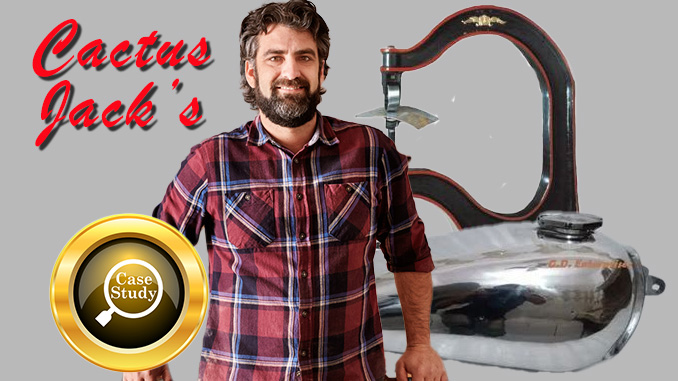
How This Account Was Sourced
This was a great small business factoring account sourced by IACFB itself and provided monthly commssion income for well over 4 years. It was sourced by a form lead from one of our existing accounts that was operating in an”Enterprise Zone” for small local manufacturers.
About Cactus Jack’s
Client name and details have been altered for confidentiality.
Jackson Sprockett, better known as “Cactus Jack,” was a talented metal fabricator who had built a reputation for crafting custom fenders and fuel tanks for motorcycles. In 2010, he launched Cactus Jack’s Custom Tanks, specializing in creating bespoke parts for motorcycle enthusiasts. Using his expertise with an English wheel, a tool used to shape sheet metal, Jack quickly became a respected name in the custom bike community.
Jack’s skills caught the attention of the broader motorcycle world after being featured in a popular biker magazine with a national readership. As a result of this exposure, demand for his work soared, and Jack found his small shop bustling with orders. However, most of his projects were one-off custom jobs for individual clients, and while the business was steady, it wasn’t scalable.
That changed shortly after the magazine article when Jack was approached by a regional motorcycle parts supplier. The supplier proposed that Jack create an exclusive line of “Cactus Jack” fenders and tanks to be stocked in their 37 stores. This was a game-changing opportunity for Jack, as it offered the chance to grow his brand beyond his custom projects. The supplier estimated they would need around $3,000 in inventory per store monthly, totaling over $110,000 worth of products.
The Challenge: Financing Growth with 45-Day Payment Terms
Although thrilled by the opportunity, Jack faced a major challenge. His small, custom-focused shop wasn’t equipped for large-scale production. To meet the supplier’s demand, he needed to hire at least one skilled aluminum fabricator and one gas welder experienced in thin-gauge aluminum welding—both of whom came with significant payroll costs. On top of that, the parts supplier required net 45-day payment terms, meaning Jack wouldn’t get paid for at least six weeks after delivering the inventory.
This created a financial gap. He needed to cover the payroll and material costs upfront but wouldn’t see payment for 45 days, making it impossible to fulfill the order without external financing.
Exploring Factoring as a Solution
Jack remembered that his brother, who ran a local janitorial service, had been using a financing solution called factoring to manage his payroll for years. Curious if factoring could work for his custom fabrication business, Jack reached out to his brother, who gave him the contact details of a reputable factoring company.
After a quick phone call with the factor, Jack explained his situation, and the factor reviewed the credit rating of the motorcycle parts supplier. To Jack’s relief, the supplier’s credit rating was excellent, which qualified them for a factoring line of credit. The factor could finance 100% of the supplier’s invoices, offering Jack a credit limit of $100,000. This was more than enough to cover his payroll and production costs.
Factoring was the perfect solution for Jack because he didn’t have traditional bank financing in place. The factor secured a 1st lien position on accounts receivable, which is a standard requirement in factoring agreements.
Implementing the Factoring Agreement
The factoring company quickly assigned an account executive to work with Jack and his team. Within days, Jack received a Master Purchase and Sales Agreement (factoring contract) via overnight courier. After reviewing the agreement, he signed and returned it, officially setting up his factoring line.
Now, Cactus Jack’s Custom Tanks was equipped with the necessary working capital to confidently hire the two additional employees and scale up production. Jack could now meet the supplier’s demands without worrying about payroll or the long payment terms. The factor advanced the majority of the invoice amount upfront (usually 80-90%) and would release the remaining balance once the supplier paid, minus a small factoring fee.
Benefits of Factoring for Cactus Jack
Factoring not only gave Jack the cash flow needed to finance payroll and materials, but it also provided several other key benefits that contributed to his company’s growth:
- No Debt Incurred: Unlike traditional loans, factoring doesn’t add debt to the balance sheet. Instead of taking on debt, Jack was simply advancing funds on invoices he would be paid for anyway, keeping his business financially healthy.
- Increased Flexibility: Factoring allowed Jack to scale his operations based on demand. As his order volume increased, so did his factoring line, giving him the financial flexibility to keep up with larger and more frequent orders.
- No Waiting for Payments: Instead of waiting 45 days or more to get paid by the parts supplier, Jack had access to the majority of his money almost immediately after issuing an invoice. This gave him peace of mind and allowed him to focus on production rather than cash flow issues.
- Easier Payroll Management: Factoring ensured that Jack could meet his payroll commitments on time, every time. His new employees were paid without any hiccups, and Jack didn’t need to worry about covering those expenses before being paid by his customer.
- Improved Vendor Relationships: With consistent cash flow, Jack was able to pay his material suppliers promptly, which helped him build stronger relationships with them and possibly secure better pricing or terms in the future.
Factoring Commissions for a Broker
This account was an existing cleint referral…but…had a broker been involved in this factoring transaction, they would have earned a commission of $350 – $450 per month, based on the volume of invoices financed through the factor. Over the long term, this could have been a lucrative and steady source of income for the broker.




